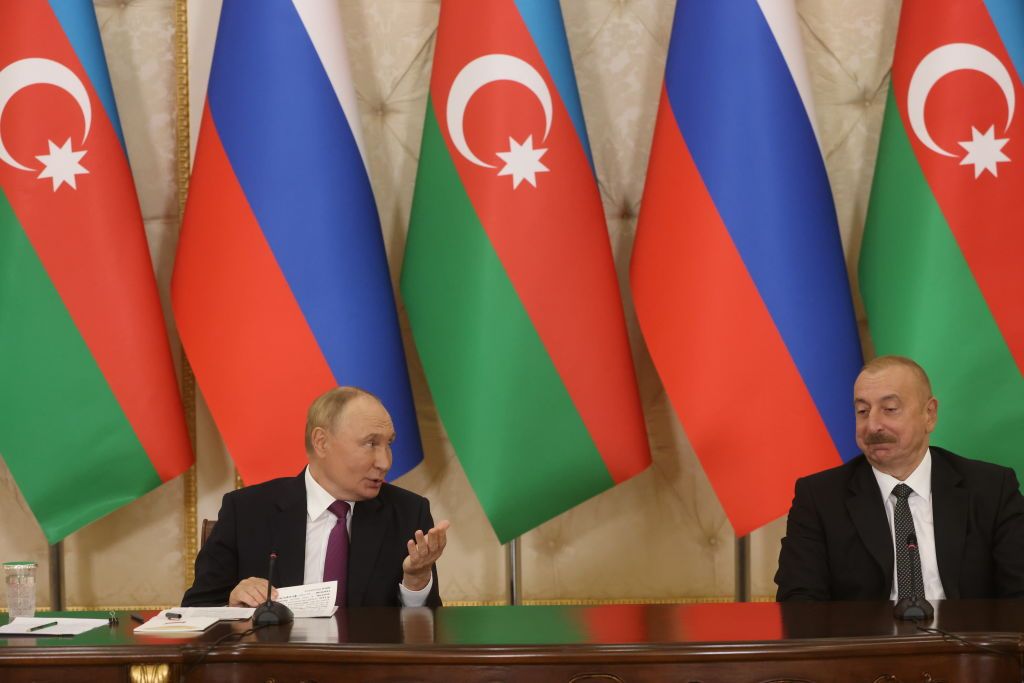Explainer: Why Armenia-Russia relations continue to deteriorate

Since the start of Russia’s full-scale invasion of Ukraine, Moscow appears to have learned to live with increasingly hostile relations with the West. Thousands of kilometers east of Ukraine, however, relations with one country in the South Caucasus have become increasingly cold, in the aftermath of an entirely different conflict.
Relations between Russia and Armenia have been deteriorating for several years but escalated dramatically when Russian "peacekeepers" deployed in the region failed to prevent Azerbaijan's September 2023 offensive into Nagorno-Karabakh, a long-disputed enclave primarily populated by ethnic Armenians, but internationally recognized as Azerbaijan territory.
This summer then saw a historic departure from Armenia’s international Zvartnots Airport, when Russian border guards finally left the building, 32 years after their deployment began.
Yerevan had informed Moscow in March 2024 that the presence of their guards to assist with border controls at the airport was no longer needed, and the last Russian guards left the airport on July 31.
Russia’s Foreign Ministry described the move as causing "irreparable damage" to relations between the two countries.
A month later, the damage appeared to intensify further. Armenian Prime Minister Nikol Pashinyan announced during a press conference that Armenia had suspended its participation in the Collective Security Treaty Organization (CSTO).
"The Republic of Armenia 'has frozen' its participation in the CSTO at all levels, and at this stage, we consider this decision sufficient," Pashinyan said on Aug. 31.
What is the CSTO and why does Armenia want to leave?
The CSTO was established in 2002 and includes Russia, Armenia, Belarus, Kazakhstan, Tajikistan, and Kyrgyzstan. Russia is by far the most powerful member of the alliance, which is similar to NATO in its structure.
Since the start of 2024, Armenia made multiple threats to leave the organization. In May, Yerevan refused to finance the CSTO, despite the budget being approved the previous November.
Yerevan has argued that the military alliance has failed to address Armenia's collective security concerns.
According to Article 4 of the CSTO Treaty, if a member state experiences aggression, then all member states must come to its aid — similar to NATO's Article 5 principles.
The CSTO did not intervene during Azerbaijan's offensive in September 2023. Around 100,000 people were forced to flee to Armenia as Azerbaijani troops established control over the area, and the self-declared Nagorno-Karabakh Republic was dissolved.

While the CSTO is a Russia-led organization, formally it has to consider the views of other member states, Olesya Vartanyan, an expert on security issues in the South Caucasus, told the Kyiv Independent.
“Leaders of some of these countries have openly stated that they do not want to create new problems with Azerbaijan at Armenia’s expense” and appear indifferent to Armenia’s struggles, Vartanyan said.
This includes Belarus, which delivered advanced weapons to Azerbaijan for years, according to a Politico investigation.
“Who needs Armenians? Nobody. Let them develop their economy and rely on their own resources,” Belarusian dictator Alexander Lukashenko said on state television in August.
According to Vartanyan, the CSTO has “adopted a stance identical to what Moscow has been suggesting since the emergence of border issues between Armenia and Azerbaijan — that the two countries should first define their un-demarcated border, and then consider who could be violating which territory,”
Armenia’s relations with the West
“This indifference, coupled with verbal statements against the Armenian leadership by some member states, contributed to Yerevan’s decision to start distancing itself from the CSTO,” Vartanyan said.
Pashinyan could not name the "exact day" when Armenia would leave the CSTO. He said the government could reconsider the decision to suspend its membership in the future but did not see the need to do so for now.
Since coming to power in a 2018 revolution, Pashinyan’s government has steadily deepened the country's ties with the West, drawing condemnation from Russia. Fearing renewed hostilities with Baku, Yerevan’s move westward has only intensified since 2023 as it seeks new partnerships.
Armenia is now fostering security ties with other countries, such as France, the U.S., and India, and over the past several months, has held “several rounds of dialogue with European and American colleagues to discuss and agree on reforms in security, the economy, and other sectors,” Vartanyan said.

In March, Armenia's Foreign Minister Ararat Mirzoyan revealed that the country was considering applying for membership in the European Union, aiming to further strengthen ties with the West.
EU ambassadors in July approved the launch of a visa-free dialogue with Armenia to begin talks on a visa-free regime between the two and, for the first time in history, agreed to allocate military aid from the European Peace Facility (EPF) to the country.
In January 2024, Armenia also ratified the International Criminal Court’s Rome Statue, becoming one of 124 countries obliged to arrest Russian President Vladimir Putin if he steps foot in Armenia. Armenia originally signed the Rome Statute in 1998 but failed to ratify it.
While the Kremlin decried the move as an "unfriendly step" and "the wrong decision,” Pashinyan said in February that the ratification served as an additional measure “to increase Armenia's security.”
It remains unclear how far these steps will take Armenia, according to Vartanyan.
“Yerevan may be ready to get closer or even initiate some integration processes, but it is up to the West to send the right signals and begin a tangible process toward closer relations with Armenia.”











